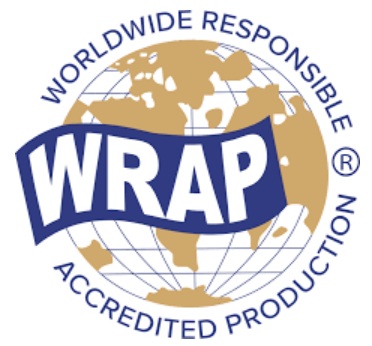WRAP – Worldwide Responsible Accredited Production

Worldwide Responsible Accredited Production (WRAP) is a globally recognized, independent, nonprofit social compliance standard developed by WRAP, a U.S.-based organization headquartered in Arlington, Virginia, with regional offices in Hong Kong and Bangladesh and representatives across Europe, Latin America, India, Vietnam, Indonesia, and Thailand. Founded in 2000 by the American Apparel and Footwear Association (AAFA), WRAP was created to promote safe, lawful, humane, and ethical manufacturing practices in global supply chains through independent certification and education—free from special interests, lobbying, or profit motives.
WRAP is the world's largest facility-based certification program for the apparel, footwear, and sewn products sectors. Its certification scope also includes home textiles, accessories, and other cut-and-sew operations, regardless of facility size. More than 3,500 certified facilities across dozens of countries—employing over 3.25 million workers—have earned WRAP certification. The program is accepted by hundreds of leading global brands and retailers, including Walmart, Disney, Costco, Gildan, and Woolworths.
Certification is based on WRAP's 12 Principles, which define the requirements for lawful, humane, and ethical production. These principles include:
-
Compliance with Laws and Workplace Regulations
Facilities must comply with all applicable laws, regulations, and standards in the locations where they operate.
-
Prohibition of Forced Labor
Facilities must not use involuntary, forced, bonded, or trafficked labor.
-
Prohibition of Child Labor
Facilities must not hire anyone below the legal minimum working age, or under 15 years old, whichever is higher.
-
Prohibition of Harassment and Abuse
Facilities must provide a work environment free of harassment, abuse, or corporal punishment.
-
Compensation and Benefits
Facilities must pay at least the legal minimum wage and provide all required benefits.
-
Hours of Work
Working hours must not exceed legal limits. Workers must receive at least one day off in every seven-day period.
-
Prohibition of Discrimination
Facilities must treat workers fairly and not discriminate based on personal characteristics or beliefs.
-
Health and Safety
Facilities must provide a safe and healthy working environment, including safe housing if provided.
-
Freedom of Association and Collective Bargaining
Facilities must recognize and respect workers’ rights to freely associate and bargain collectively.
-
Environment
Facilities must comply with environmental laws and operate in an environmentally responsible manner.
-
Customs Compliance
Facilities must comply with applicable customs laws and regulations, especially those addressing illegal transshipment.
-
Security
Facilities must maintain appropriate security measures to prevent unauthorized access, theft, or tampering.
The Principles are aligned with internationally recognized standards, including the International Labour Organization (ILO) Conventions, the OECD Guidelines for Multinational Enterprises, and the UN Guiding Principles on Business and Human Rights. They also support the UN Sustainable Development Goals (SDGs), particularly SDG 8 (Decent Work and Economic Growth), SDG 12 (Responsible Consumption and Production), and SDG 5 (Gender Equality).
WRAP's certification process includes four main steps:
1.Application – Facilities register and select a WRAP-accredited monitoring firm.
2.Pre-audit self-assessment (optional) – Facilities may complete a preparatory tool to identify compliance gaps.
3.Audit – Independent auditors conduct an in-depth compliance audit, including facility tours and confidential worker interviews.
4.Certification – Facilities that meet the requirements are awarded Gold (1-year validity) or Platinum (2-year validity) certificates based on audit findings and overall performance.
All certified facilities are subject to unannounced post-certification assessments to ensure continued compliance. WRAP also provides training for factory managers, buyers, and social compliance professionals, and supports facilities through global compliance officers who advise on remediation and long-term improvement strategies.
WRAP distinguishes itself from other programs with a clear facility-based certification model and a pragmatic, implementation-focused approach. For example:
•BSCI (amfori Business Social Compliance Initiative) follows a continuous improvement model and does not issue formal certificates.
•SA8000 by Social Accountability International applies across all sectors and emphasizes living wages and management systems.
•The Higg Facility Social & Labor Module (FSLM) developed by the Sustainable Apparel Coalition uses a scored self-assessment model, later verified by third parties, with broader data-sharing capabilities.
To address audit duplication, WRAP promotes Symphonization—an approach that encourages alignment among brands and retailers in their audit requirements, reducing the audit burden on factories and allowing greater focus on operational improvement.
The certification program undergoes regular review every two years, informed by WRAP's two key advisory bodies: the Monitors' Council (comprised of accredited monitoring firms) and the International Advisory Group (made up of global sourcing and compliance experts). Between formal cycles, WRAP's compliance team gathers field data and factory-level feedback to drive updates. The organization is governed by a multi-stakeholder Board of Directors composed mainly of non-industry members—NGOs, academics, retired officials, and company representatives—ensuring objectivity and accountability.
More details are available at the official site.

